Photo
Amazing! Thanks for this!

Les Misérables - Owarinaki Tabiji
Starring Dean Fujioka and Arata Iura
It’s been a long month but at last we finished the subs! These subs wouldn’t be possible without either @i-demitas or @vapaus-ystavyys-tasaarvo
The raws can be downloaded here, with special thanks for j-raws for providing the raws. The subs can be found here.
If you get lost, vapaus has translated the character sheet from the drama special’s web page here.
Tell us if you liked it!
24 notes
·
View notes
Photo

So I’ve recently discovered the concept of DTIYS and I really wish I’d known about it sooner. It’s a perfect idea for someone like me who loves drawing but can never really think of a subject for a drawing...
In any case, here’s my entry for @whiteleyfoster‘s current DTIYS. It’s coloured pencils (mainly white and black, obviously) on black paper and I hope the photo is clear enough for some of the details. I experimented for ages with how to take it as the scans all came out looking extremely flat.
#good omens#dtiys#whiteleyfoster#jazz baby#crowley#aziraphale#colour pencil on black paper#I have no idea what the little red spot on the left is#whiteleyfoster dtiys
280 notes
·
View notes
Text
Small Gods. It’s relatively early in the Discworld novels, so the functioning of the Discworld is explained, but it’s late enough for the “rules” of the world to have been settled. It’s also, in my opinion, one of the best Discworld books.
Hello! I have never read a Terry Pratchett novel in my life (a disservice to myself, I know) unless you count Good Omens which he did co-author. I would like to read one of the books he wrote alone but the entire scale of the discworld series sorta intimidates me, are there any standalones you guys might recommend? Thanks!
1K notes
·
View notes
Text
I may be seriously behind times, but does anyone know what happened to the abaissé boards?
Cheers
6 notes
·
View notes
Text
Script for the unaired scene of Aziraphale opening his bookshop in 1800

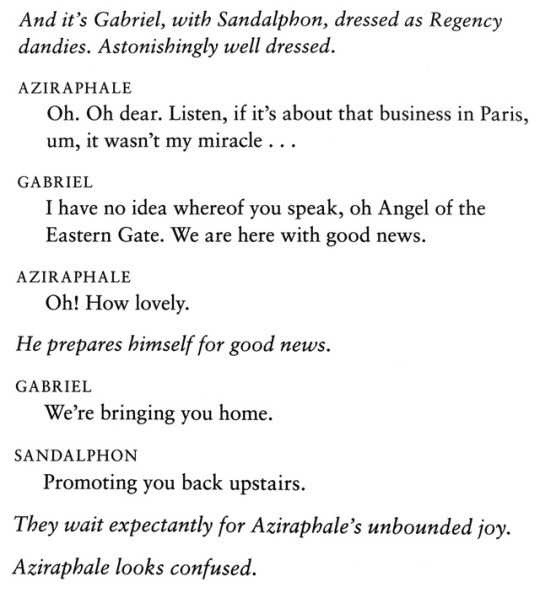
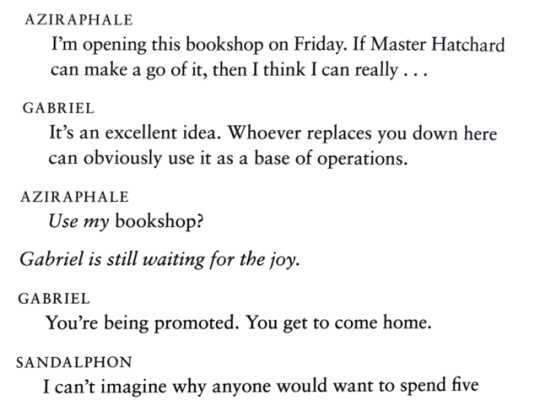

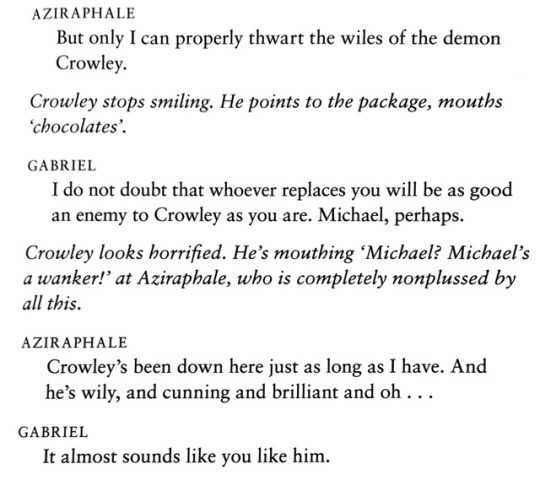

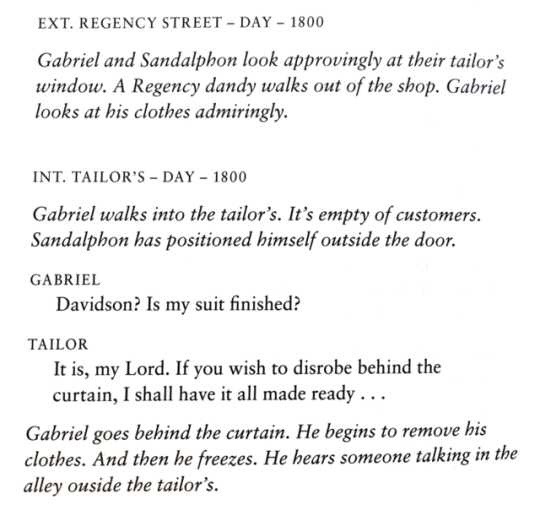

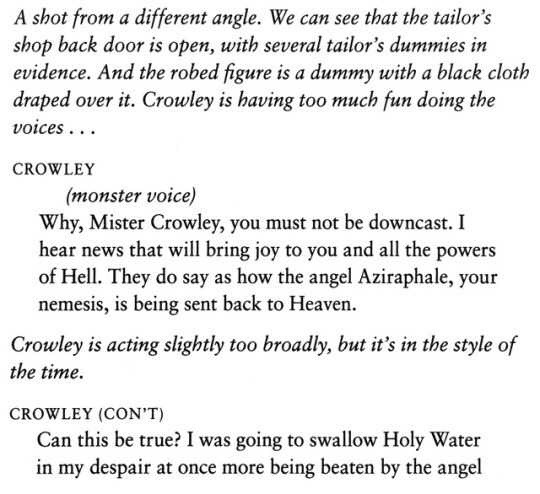

I’m not saying that we were robbed, I’m just saying that we were EXTREMELY robbed
“Michael’s a wanker” OHHH COME ON! WE DESERVED THIS SCENE
44K notes
·
View notes
Text


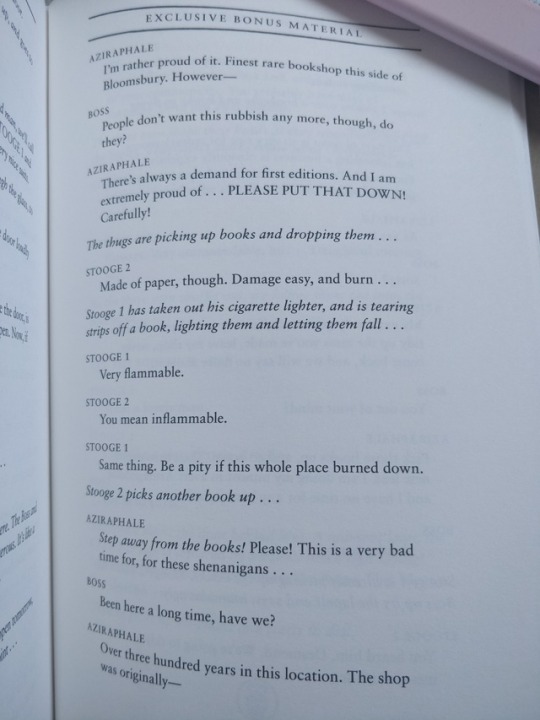
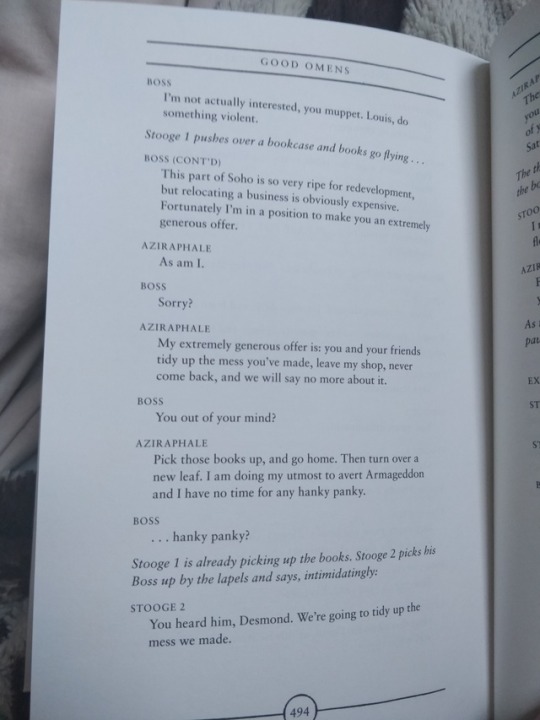


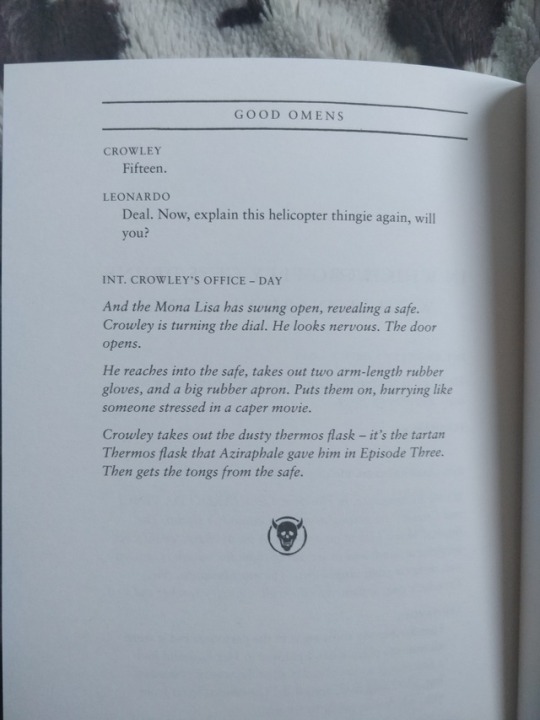
For your viewing pleasure (and because capitalism is the WORST) the deleted scenes from the Special Edition GO Script Book.
I’ve had to split the scenes up because.. well Tumblr. So here is Aziraphale Meeting the Neighbours and Crowley Getting Drunk With Da Vinci!
(special shout-out to @katbelleinthedark for asking for these!)
587 notes
·
View notes
Text
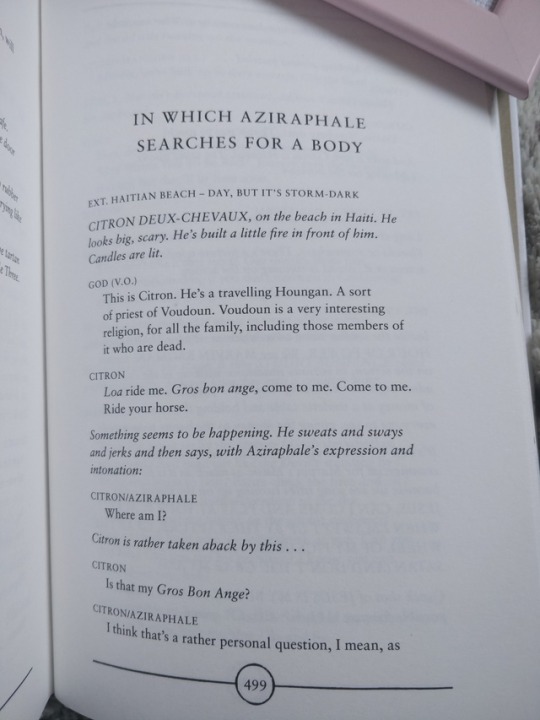
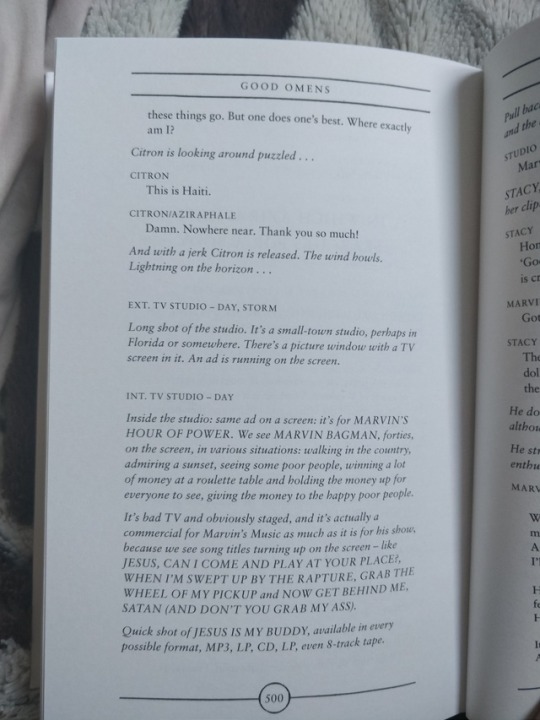
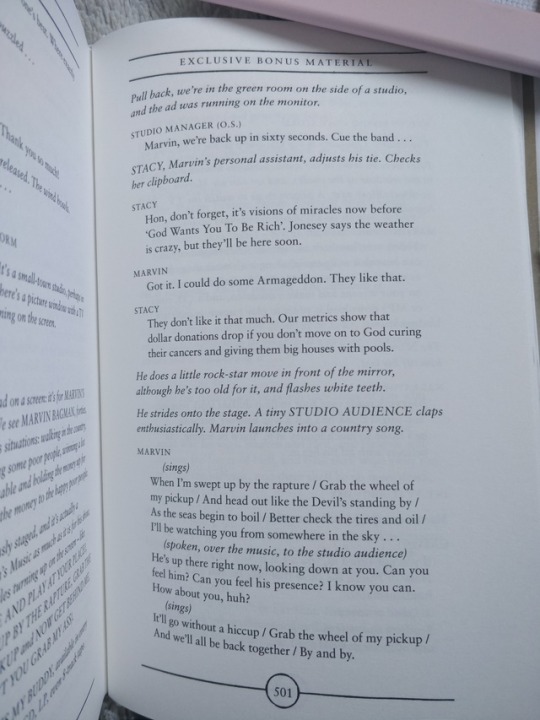

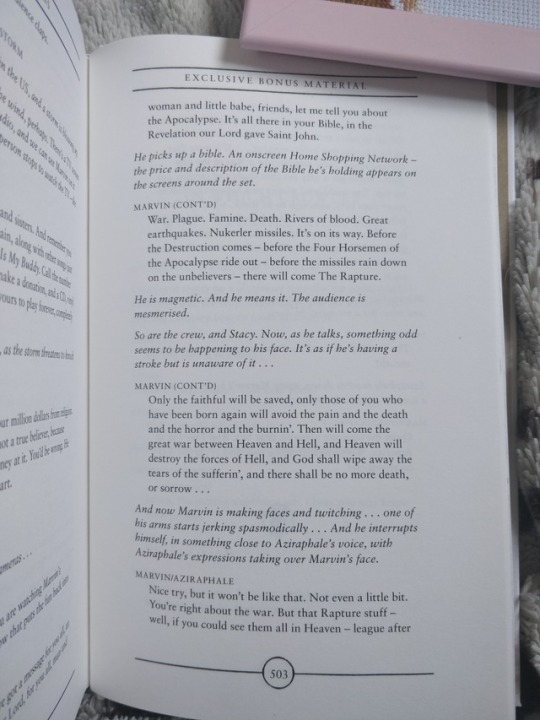

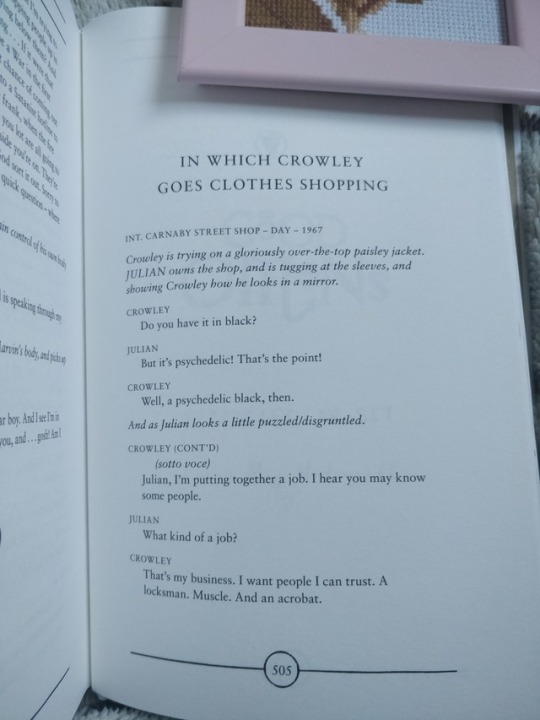

For your viewing pleasure (and because capitalism is the WORST) the deleted scenes from the GO script book!
Here you can find Aziraphale Searching For A Body and Crowley Going Clothes Shopping!
(again, special shout-out to @katbelleinthedark for requesting these)
382 notes
·
View notes
Text
Los miserables, 1971 – “Holy Hugo, they included ‘insert rare scene here’!”
Wrote this a while ago and realised I never posted it. So here goes.
Do you have a favourite obscure scene or detail in Les misérables that hardly ever makes the cut in screen adaptations? If you do, this might just be the adaptation for you. If you want to see an adaptation that tells the story well, however, this is not for you.
It's a nineteen-part (coincidence? I think not...) TV adaptation by the Spanish channel RTVE within its show “Novela”, a show of multiple literature adaptations that ran for fifteen years in total!
And the best part: You can see it all online on RTVE's webpage: http://www.rtve.es/alacarta/videos/los-miserables/
You can skip all episodes with mod 5 = 1 (except the first one), those are the episodes originally shown on Mondays, recapping what happened last week.
Like the Italian TV adaptation, this is unfortunately hindered by its budget. Unlike the Italian TV adaptation, this has the additional problem of its screenwriter's frankly bizarre understanding of concepts such as “pacing” and “importance”.
Now, don't get me wrong, I think it's rather cool to have an adaptation that includes many of the more obscure scenes, but I know the book and I know the context for all of these. I think asking how much sense the plot actually makes to someone who only knows this adaptation is a legitimate question.
Time is “wasted” on montages, dream-sequences and scenes of characters tossing and turning in bed, all of them many times longer than they have any right to be. Partially, it feels like the screenwriter couldn't decide which plot details to include and then just tried to incorporate as many of them as possible – continuity be damned. As an example, he took the time to include Mabeuf's death at the barricade, but it doesn't mean anything, since it happens to a character we have never seen before. Because Mabeuf's entire background is missing. To top it off, the watching students call him “le conventionel”, probably just to tick another box on the check list. To get another time saver, “show, don't tell” is occasionally blatantly violated. We get Valjean's entire history from him telling his life story to the bishop. The backstory of Marius and Gillenormand is conveyed in their fight before Marius leaves, meaning all the info is solely for the benefit of the audience, because all characters involved already know this stuff. Yet, bizarrely, they occasionally have time for a “show” where none would have been necessary. We get a far too long montage of Fantine with Cosette in Paris, that includes Fantine getting fired from her old job. Honestly, you can cover the question of why Fantine leaves Paris with a single line – you know, like it's done in the original?
I wouldn't usually mind, but it not only messes up the pacing, but it also takes up time that could have been used to flesh out some of the details. Or even some of the main plot points. We have Marius letting Thénardier go at the end, but Marius doesn't owe him a debt in this one. It might have made the Gorbeau robbery easier, but at the end, Marius has no real reason to not call the police. That is, if Thénardier is even a prison escapee. It's never shown nor mentioned how he got out of prison after the Gorbeau house robbery. On a smaller scale, it leads to a few bizarre moments, where introductions or transitions are missing, as if someone was trying to cut the corners wherever possible. For example, one episode starts with Marius' and Gillenormand's fight, without any introduction to their conflict or any real introduction of the characters (apart from Marius being the cute boy from the park). Or take the Champmathieu trial. The prosecutor asks for the witnesses to be heard and the very next moment, the judge is already questioning Brevet. No scene of the witnesses entering the room or at least the camera pointing out that they've been there all the time (because I definitely missed that in the overhead shots of the fairly small courtroom set); no scene of the judge calling the first witness, which becomes even worse when he does it to every subsequent witness.
Between this kind of overly short editing and long, drawn-out scenes of Marius healing (which commits the additional cardinal sin of making us think that it's finally over with a short conversation, only to continue for another minute or so) or of Fantine tossing on her bed (which we only later realise is prossibly Cosette's birth!), it feels a bit like there were too many people involved and no two of them could disagree over the tone and style of this adaptation.
I have another, if slightly petty, complaint: Why do the opening credits contain pictures of scenes we never get to see? It makes it pretty hard to identify which actor played which character and it also made it look they would include scenes that end up not being there. From the credits, you could be forgiven for thinking that there are scenes in Toulon, that Valjean's sister shows up or that they include the scene where Éponine stops Patron-Minette from robbing the house in the Rue Plumet. None of these actually happen.
Just to finish my list of complaints about this adaptation, let me talk about Javert. Now, I like the basic idea of what they did with the character, if only because it is the opposite to what most other adaptations do. In many adaptations, Javert is portrayed as a far more villainous character than in the book. These guys went the opposite way. Javert is calm and polite most of the time (making his one outburst when he arrests Valjean even more meaningful) and in one scene seems concerned about Fantine's safety (while she's still employed at Madeleine's factory that is), when he meets her in a disreputable part of town after dark and insists on accompanying her to her destination. Yes, it's later made clear that he still uses this to find out what she was doing there in the first place and this is what kicks off the chain of events leading to Mme Victurnien finding out about Cosette, but the two scenes taken together imply that Javert is both caring about the safety of an innocent civilian and spying on said civilian, just in case they're not as innocent as they seem to be. If they had done it like this throughout the movie I wouldn't be complaining.
Yet, it also means they had Javert come up to Madeleine, stating that he is happy to be the first to congratulate him about his appointment as mayor. It makes Javert's later resentment of Madeleine seem quite petty. Or the end of the “Confrontation”, where Javert, rather than leading Valjean out of the room, just makes a hand gesture to ask him to step out. Which again could have worked, but then he would have had to stay polite for all of the scene. Which he didn’t. They also decided not to stick to it for the entirety of the series. The portrayal of Javert in the later parts is more “traditional”, so to speak.
The acting is solid, for the most part, but hardly ever outstanding, although I’m likely not the best judge. Valjean's acting is fairly, occasionally too, subtle and he's a bit too calm for my taste in his entire encounter with the bishop. The actor, Pepe Calvo, is better known for his work in spaghetti western movies and I've by now realised that the reason he seemed familiar to me from the beginning is because of the western “Dead Men Ride” which I saw as a child, in which he plays a Myriel-like character of all things. I've described my thoughts on Javert, but I think that is due to decisions by the director and the scriptwriter, not the actor. Fantine has an annoying tendency to overact, especially in the later parts of her appearance. Cosette, fortunately not played by the same actress, is a bit boring. Little Cosette, however, does outstanding work for a child actress. Both Thénardiers are decent; they went the “Mme Thénardier needs to look sufficiently trustworthy for Fantine to leave her child with her”-route and she doesn't quite manage to be as scary as she should be. Everybody else is rather unremarkable.
Oh, and while we're at it: If you cast as Cosette an actress who actually looks like a teenager and as Marius an actor who might be in his early thirties, you need to specify that Marius is only a few years older than Cosette. Please!
But now to what I like about this adaptation: It's occasionally insane attention to details.
I've complained about the over-abundance of dream-sequences, but some of them really work. Showing one of Cosette's daydreams explains her life, character and dreams much better than any number of “real” scenes could have. Even more awesome is the inclusion of Valjean's dream before the Champmathieu trial. I mean, “Tempête sous un crâne” is usually going to be a weird scene anyway, you might just replace it with a weird dream while you're at it. Also, holy shit, they included Valjean's dream! That's a definite first.
Here's a list of further uncommon scenes this movie has:
-Valjean steals Petit-Gervais's coin, although he does it before meeting the bishop
-The bishop gets some exposition. It's only done in two conversations with his sister and Mme Magloire, but it's there
-The scene of Tholomyès and Co. dumping the girls
-A meeting of the Amis verbatim from the book
-Gillenormand believes Marius to be dead and faints when Marius opens his eyes.
And here's a list of crazily uncommon scenes this movie has:
-Fantine's meeting with the Thénardiers includes the girls using a cart chain as a swing
-Details about work in the jet factory
-Fantine thinks she hears Cosette outside the hospital
-Cosette lying about watering the guest's horse
-The coffin-escape! In full, glorious length and details.
-Javert has a letter from the prefect in his pocket
-Marius' note to identify his corpse
-Escaping from the barricade in National Guard uniforms (although Valjean doesn't put in the one he is currently wearing)
-Valjean writes the letter explaining to Cosette the origins of his fortune
Also, the ending is really well done. I really recommend you watch it for yourself, I don't think describing it can do it justice.
Generally, avoid this for a first look at Les Mis, but for a fan this is an interesting adaptation to watch and I suggest you give at least some parts a look, if only for the novelty.
33 notes
·
View notes
Note
GNU Terry Pratchett
GNU Terry Prachett
GNU Terry Pratchett
23K notes
·
View notes
Text
You’re thinking of Scarpia. A scalia is an opening in a ship’s gunwale that allows water to drain.
I have no idea who Scalia was. Isn’t that the thing that people call themselves when they are furries but with reptiles?
71K notes
·
View notes
Text
Okay, I did a little searching for the scene angualupin described...
Les misérables, 1925 (even in the incomplete version): Not literally, but it has a wonderful moment where the bishop invites Valjean in, and Valjean looks at his passport as though checking that it doesn’t suddenly say something else than what it used to...
Les misérables, 1934 (or 1933 as I keep saying): Yep, has it. One of my favourite versions of the scene, actually.
Les misérables - Jean Valjean, 1963 (3rd part of the Théâtre de la Jeunesse version): Very literal version of the scene. I generally like Chevrier’s Valjean, but you might also argue that his delivery is a little too emotionless.
I miserabili, 1964: Definitely watch this one, whether you know Italian or not! It’s pretty near perfect.
Los miserables, 1971: Another really literal one: http://www.rtve.es/alacarta/videos/los-miserables/miserables-capitulo-1/2151187/
Les misérables, 1972: A very short scene, but Geret’s delivery stands out. He acts as if he’s actively trying to scare people.
Los miserables, 1973/1974: Another one I’d absolutely recommend! Luckily enough among the excerpts on youtube: https://www.youtube.com/watch?v=wjxTBTEMbSI
Les misérables, 1985 (Not sure about the 1982 cut): It’s not literally the same scene as in the book, but it might still be what you’re looking for.
All of this, btw, doesn’t mean that I’m not 100% behind the request for an entirely unabridged adaptation of Les misérables.
Reason #2,4601 why I want The Brick On Screen, Unabridged: Valjean holding out his passport to Bishop Myriel, desperation in his voice. “Do you see what it says here? I can read it, there was a school for convicts at the galleys, and they taught me how to read. I can read it! It says I am a parolee, a dangerous man, see, here! So will you turn me away?”
ALL THE FEELS the pathos gods it’s just Hugo punching you in the face with EMOTION look how utterly fucked up we are as a society to reduce a human being to this and just the reading thing I can’t even deal SO MANY FEELINGS I’m going to go cry now
Also this is making me think about Hugo and agency again, because Valjean is pathetic here in the original meaning of the word, he is reduced to pathos and base instincts. His theft of the silver is his own action, but to an extent it is not a product of his conscious thought, because he has little consciousness left to him at this point. It is Myriel’s generosity that sparks thought in him again, and through that allows him to take charge of his own destiny (to the extent than anyone can, in a Hugolian universe); like Eponine, later in the novel, who makes her own choices for the first time when she falls in love with Marius, it is love that grants Valjean agency. There is also something to be said here about Hugo’s conception of men versus beasts? And the importance of both love and agency to the distinction. But that part needs to be worked on a bit.
272 notes
·
View notes
Text
That is indeed the one I meant. I keep referring to it by production year rather than publication year.
I can’t currently comment on which adaptations have the requested scene because I’m far away from my collection. Could check in a few days, though.
Reason #2,4601 why I want The Brick On Screen, Unabridged: Valjean holding out his passport to Bishop Myriel, desperation in his voice. “Do you see what it says here? I can read it, there was a school for convicts at the galleys, and they taught me how to read. I can read it! It says I am a parolee, a dangerous man, see, here! So will you turn me away?”
ALL THE FEELS the pathos gods it’s just Hugo punching you in the face with EMOTION look how utterly fucked up we are as a society to reduce a human being to this and just the reading thing I can’t even deal SO MANY FEELINGS I’m going to go cry now
Also this is making me think about Hugo and agency again, because Valjean is pathetic here in the original meaning of the word, he is reduced to pathos and base instincts. His theft of the silver is his own action, but to an extent it is not a product of his conscious thought, because he has little consciousness left to him at this point. It is Myriel’s generosity that sparks thought in him again, and through that allows him to take charge of his own destiny (to the extent than anyone can, in a Hugolian universe); like Eponine, later in the novel, who makes her own choices for the first time when she falls in love with Marius, it is love that grants Valjean agency. There is also something to be said here about Hugo’s conception of men versus beasts? And the importance of both love and agency to the distinction. But that part needs to be worked on a bit.
272 notes
·
View notes
Text
Haha, feel free to do so. I could use some encouragement to sit through Telemundo’s modern-day not-really-les-mis series... ;)
Reason #2,4601 why I want The Brick On Screen, Unabridged: Valjean holding out his passport to Bishop Myriel, desperation in his voice. “Do you see what it says here? I can read it, there was a school for convicts at the galleys, and they taught me how to read. I can read it! It says I am a parolee, a dangerous man, see, here! So will you turn me away?”
ALL THE FEELS the pathos gods it’s just Hugo punching you in the face with EMOTION look how utterly fucked up we are as a society to reduce a human being to this and just the reading thing I can’t even deal SO MANY FEELINGS I’m going to go cry now
Also this is making me think about Hugo and agency again, because Valjean is pathetic here in the original meaning of the word, he is reduced to pathos and base instincts. His theft of the silver is his own action, but to an extent it is not a product of his conscious thought, because he has little consciousness left to him at this point. It is Myriel’s generosity that sparks thought in him again, and through that allows him to take charge of his own destiny (to the extent than anyone can, in a Hugolian universe); like Eponine, later in the novel, who makes her own choices for the first time when she falls in love with Marius, it is love that grants Valjean agency. There is also something to be said here about Hugo’s conception of men versus beasts? And the importance of both love and agency to the distinction. But that part needs to be worked on a bit.
272 notes
·
View notes
Text
Definitely not the 2001 miniseries! I’ve only said that I don’t hate it as much as a lot of other people do...
Correct on the Italian miniseries, though. My other contestant for the best Les Misérables adaptation would be the silent movie from 1925. It’s not quite as complete as the Italian miniseries, but does more interesting things with its medium. Plus, it gets extra points for being shot nearly entirely on location. But... well, it’s a silent movie. And since the copy I saw didn’t even have music, it means sitting through seven hours of silence. I just can’t enjoy that as much as the movie would otherwise deserve. Oh, and it’s one of those that you have to go to the Forum des Images to see...
Finally, there’s the 1933 version which has less one specific big problem and more a few small ones. But it’s still really complete, with good acting, good design and a good atmosphere in general. I’d call it the best compromise between book-accuracy and movie enjoyment. Oh, and it’s a version you actually have a chance getting your hands on.
Btw, by my last count I’ve watched (or am still watching, some of these are loooong) 43 adaptations. Of 82.
Reason #2,4601 why I want The Brick On Screen, Unabridged: Valjean holding out his passport to Bishop Myriel, desperation in his voice. “Do you see what it says here? I can read it, there was a school for convicts at the galleys, and they taught me how to read. I can read it! It says I am a parolee, a dangerous man, see, here! So will you turn me away?”
ALL THE FEELS the pathos gods it’s just Hugo punching you in the face with EMOTION look how utterly fucked up we are as a society to reduce a human being to this and just the reading thing I can’t even deal SO MANY FEELINGS I’m going to go cry now
Also this is making me think about Hugo and agency again, because Valjean is pathetic here in the original meaning of the word, he is reduced to pathos and base instincts. His theft of the silver is his own action, but to an extent it is not a product of his conscious thought, because he has little consciousness left to him at this point. It is Myriel’s generosity that sparks thought in him again, and through that allows him to take charge of his own destiny (to the extent than anyone can, in a Hugolian universe); like Eponine, later in the novel, who makes her own choices for the first time when she falls in love with Marius, it is love that grants Valjean agency. There is also something to be said here about Hugo’s conception of men versus beasts? And the importance of both love and agency to the distinction. But that part needs to be worked on a bit.
272 notes
·
View notes
Text
Recap of Los miserables, part 2
Yeah, it took a while. Thank two night shifts during a fairly boring experiment that it didn’t take even longer…
Read up on Part 1, if you haven’t/forgot about it: http://trompe-la-mort.tumblr.com/post/135447323963/recap-of-los-miserables-or-wait-what
So, Javert has just left the barricade and returns to the prefect’s office. He states that he escaped miraculously from the barricade and despite the fact that he’s lost his hat and is quite obviously shaken, nobody bothers to inquire what happened to him. Also, apparently, a number of escapees from La Force-prison (or “La Fosse” as the incompetent subtitles-guy calls it) got mixed in with the fleeing rebels, which we could think is important (spoiler: it won’t be). Also also, there’s a policeman called Leblanc, which I find amusing.
Shots of the barricade falling. Pretty much out of nowhere, we see Valjean carrying Marius away. This is a very weird shot, where Valjean leaves a heated battle and the camera follows him. Then, as he disappears behind a corner, the camera turns back to the barricade, where suddenly only three or so guys are standing. At least for a few seconds.
Valjean goes around the streets and finds the manhole cover. He lowers Marius into it and the scene conveniently fades out before he has to let go of Marius’ arm and drop him.
Sewers. Valjean wading through knee-deep water. In another part of the sewers, so does Javert, who somehow has gotten back his hat. Just in front of him, another guy drops down through another manhole. I don’t know who he is, I don’t know if I’m even supposed to recognise him and I don’t know if I even still care. Javert sees him and follows him without the guy noticing. Then, just as the movie makes me think that it might include the quicksand, Javert somehow senses in which direction he has to go to find Valjean. The force?
Valjean finds a barred exit and uses a rock to smash its padlock open. This also clues Javert in on the right direction for more obvious reasons. He shows up behind Valjean, just as the latter is about to leave, telling him that “the prefect will be delighted to see [him], especially in the company of this dead body.” Valjean protests that his entire life (entire? I doubt that…) has been dedicated to doing good and that he’s only trying to save the boy’s life. And then: “I thought that I had bought my liberty with your life, but now I see that I committed an error, saving you”

Sigh… This is about the worst line in a Les Mis movie since “That’s what your mother called God” and “Your father would not have approved of this.”
Anyway… Javert says that he’s sorry for Valjean, but that he doesn’t sell anyone’s liberty, even for his own life. Just then, the guy from the sewers comes up behind Javert, dramatically telling him that he’s wrong and stabbing him with a knife. Or he would have, if Valjean hadn’t told him to stop. He calls the guy “citizen”, so I can only assume Valjean recognises him from the barricade, even if I don’t. Valjean then gives a little speech about how Javert never had any interest in life but also how he never knew human emotions, but that he’s sure there’s some shame in him, because even his old friend Jean Valjean, who’s supposed to be a stubborn criminal, had some and that’s why they’re going to let Javert go.

Yeah, I can’t really claim I understand the logic of that either. Mr Spock would hate this scene.
Cut. Javert is walking through the streets. He looks as though he’s about to start crying. Close-up on his legs; he can hardly walk. Fade to his room/office, where he’s pacing and thinking. Then sitting and thinking. The scene is far too long to keep up tension. Next, we’re shown a note Javert probably wrote, without ever seeing him write it. It’s so inconveniently shot that I can’t even read the full last sentence: “…never… the day will come… my efforts… be destroyed by an absolute failure.” Signed with an unnecessarily squiggly signature that doesn’t fit Javert. The camera pans over to a revolver. A right hand takes it, while a left grips the table cloth where the gun just was. Another camera pan, Javert’s hat has fallen onto the floor.
Is it me, or does one get the feeling that Javert doesn’t kill himself for all the reasons in the book in this one? I mean, it looks like Javert has no qualms arresting Valjean after Valjean saved his life. He even continues to think of Valjean as a criminal, as he’s insinuating that Valjean killed Marius. So what’s going on here? Did it take Valjean saving his life twice for Javert to get scruples? I feel he kills himself simply because he has failed to arrest Valjean.
Elsewhere. Valjean carries Marius into a big mansion, where Gillenormand takes ages to cross the hall to meet him. Valjean, rather than saying anything relevant, tells him that “it would be good to be the king’s advisor, if the king listened only to good advice”. Gillenormand says that he doesn’t follow and I’ve never agreed that much with him. Valjean then answers that “like the entirety of France” he knows that the king only follows Gillenormand’s advice and that therefore Gillenormand is responsible for that (pointing at unconscious Marius). Okay, movie, if you say so. First time I heard about it. Valjean leaves and Gillenormand finally decides to fuss over Marius like he’s supposed to.
Cut. Cosette standing at the window, watching the snow fall. The following conversation reveals that the movie did not fuck up the chronology but that several months have indeed passed. Cosette complains about the anguish of the past months with Marius between life and death and Valjean tries to comfort her, saying that it all will pass. Okay. The anguish will pass. With you. And one day she’ll forget him.

How could Valjean at this point still think that Cosette would just move on from Marius? Also, if that’s the case, why would he even have bothered to go to the barricade? Cosette is understandably pissed off and leaves the room to retrieve the musical box Marius gave her during an earlier meeting (yeah, yeah, I forgot to mention that in part one. Had forgotten the thing showed up again). Valjean hears its music, seems to be making up his mind about something and leaves the house.
Cut. Gillenormand’s house. Valjean walks up to Marius who looks rather well for someone who, according to Cosette, is still not well enough that his survival is guaranteed. Anyway. Valjean tells Marius that he would never have returned to this house if circumstances hadn’t forced him. Okay, movie, hold your horses for a second. Marius does not seem surprised, does that mean he knows who saved his life after the barricade? Urgh… Marius asks if it’s Cosette who sent Valjean, but it isn’t. Yet, his presence has something to do with the two of them. Then Valjean drops the bomb: This love must stop. Marius wants to know why, but Valjean doesn’t want to tell him. Marius insists and Valjean gives in really quickly.
So, Valjean starts his story. 30 years ago, he stole bread for the children of his widowed sister. And now he doesn’t want to steal a name. Then he skips back to the 19 years he spent in prison for the theft, before going into detail about the person he was when he left prison: his soul rotten, after years of cruelty and being kept with comrades who were pure beasts, without faith, God or hope.
Don’t blame me, I’m just quoting…
After four days of marching from Toulon and being chased away by everyone, the hospitality of a man named Monseigneur Bienvenu changed his life. He repaid him the only way he knew how: by stealing from him.
Flashback time: Valjean and the bishop. The bishop, with a grin like a mischievous child, asks him why he stole the silver when he claimed last night that he had money. Oh, and the candlesticks are worth 200 francs. All he wants is that Valjean becomes a good man with the money. Then he starts making cross signs until Valjean leaves.
A word on this scene: The only narration is that it is the next day; there are no policemen to be seen and the viewer who doesn’t know the brick should be rather confused about what Valjean is still doing here. Unless this version of Valjean was dumb enough to stick around after he stole the silver. I like the way Valjean looks, though. At least, it makes it credible that someone might have difficulties recognising him later, although I think he’s got too much hair. (A later rule from Toulon allowed convicts to start growing their hair and beard two weeks before their release. Assuming that applied to Valjean, his hair should be about 6mm long and his beard 9mm, using average hair growth rates. Both are clearly longer. There’s also Hugo’s description, which described his head hair as “shorn”. But I digress)
Cut. Valjean walking, while he narrates how “light and dark were fighting inside [him]”. A coin lands next to his foot, he puts his foot on it to steal it. The owner, a shepherd kid, wants it back, Valjean shoves him away and the kid runs crying into the forest. Then, when Valjean bends to pick up the coin, he realises what he just did.
(Another Toulon aside: Valjean calls it a five-franc-piece, the amount he would have made in two months of hard labour. According to the brick, Valjean made half a sou per day in Toulon. That’s 30 sous in two months (not subtracting weekends) or 1.5 francs. Didn’t learn that much in the friars’ school, did you, Valjean?)
Anyway, Valjean feels really bad about having stolen again and tries to find the kid again, but to no avail. He has a good cry (little question: If you’re telling the story, would you include such a sentence as “For the first time in my life, I realised that to cry can be comforting”?) and rips up his convict’s passport that just gets mentioned for the first time.
Present day: Valjean tells Marius that he never sold the candlesticks and that they’ve been with him his entire life. He sold the rest of the silver and opened a factory in Montreuil-sur-Mer, which became a prosperous town in under three years. Everyone loved him, except one person.
Flashback. Madeleine in his office, as an off-screen voice tells him that Inspector Javert wants to see him. Javert has come to ask for his dismissal. Okay, that was fast. Javert wants to be dismissed simply for suspecting Madeleine. A week ago, he had been in Paris to get information about the mayor, having noted his similarities with a con he knew. In Paris they told him he was crazy, because the con in question is in prison in Arras and will be sentenced tomorrow.
Present time. Valjean says that he realised then that the life of an innocent man was in his hands as he knew that this man could not be guilty. Note that Javert never mentioned a name!
Flashback. Madeleine pacing in his study. “What I suffered then I don’t wish on anybody. This man recalled my past. I was M Madeleine, rich businessman and merchant with a capital of 700 000 francs.” Madeleine’s struggle is over in seconds, the moment he realises that his conscience says he has to save this man.
Cut. Courtroom in Arras. Valjean arrives in time to hear Champmathieu’s defense speech, delivered while crying and slightly slurred, as if the guy was supposed to be drunk. The prosecutor gets up and asks that the defendant be convicted. The defence attorney gets up and says that there is no proof and that he submitted a certificate establishing his client’s identity. Huh?
They call the three convict witnesses, but only one of them (Cochepaille) gets to say anything. In this universe, Valjean’s prison nickname apparently was “Jean the Tiger”. Wahahahahaha
The real Valjean gets up and calls to the witnesses, asking if they don’t recognise him. Well, he recognises them. He asks Brevet to remember the words he wrote on the walls of the prison, insulting the king. That’s not nice of you, Valjean, you’ll certainly get him into trouble. I like how they keep the moment from the book where Valjean changes from formal to informal pronouns when talking to Brevet. He quotes Chenildieu’s nickname (“the atheist”, but I’ll let that slide, since the pun just doesn’t work in not-French) and makes him show a nondescript burn he has on his neck. He then shows Cochepaille’s gunpowder tattoo, but it’s of 1st of March, 1814 (in French, actually) and no explanation is given for the date. For each witness, they do one thing right and one thing wrong…
Madeleine then stands in the middle of the room and confesses to being Valjean. He then asks for a couple of hours to fulfil a promise given to someone on their death bed. As he leaves the courtroom, the narrator clues us in that this person was the mother of Cosette. She had been a worker in his factory and was dismissed without his approval. She had completely sacrificed herself for her daughter and he had gotten her into the hospital and offered to bring the child to her.
Cut. Madeleine walks into the hospital. Valjean’s narration tells us that he didn’t manage to get Cosette because of the trial and that he had to lie to Fantine (name never mentioned). He makes her write a letter to the Thénardiers (yes, she writes it herself) and Fantine apparently believes, that he has already met her, as she then asks him a number of questions about her.
Then Javert enters the room. The actor was obviously trying to make him seem excited or crazy, but the resulting wide-eyed stare is unfortunately plain ridiculous. Case in point:

The following scene, surprisingly enough, is nearly verbatim from the book, with the slight difference that Fantine knows her daughter isn’t around and the news that kills her is Madeleine’s identity. And ending after Valjean tells Javert that he killed Fantine.
Present time. Valjean tells how he was imprisoned in Montreuil, but escaped that same night to get his money withdrawn from the bank to hide it in a forest. Then, he voluntarily gave himself up to Javert and was sent back to Toulon.

On the 21st of February, 1820 (why would you change something like that???) he saved the life of a sailor from the ship “Orion”, then let himself fall into the water. They believed he was dead. A few days later he went to the inn “The Sergeant” in Montfermeil, where Cosette was. Wow, Valjean must have learned to walk really fast in the years that passed. Last time it took him four days just to get to Digne…
Flashback. Mme Thénardier is being nasty to Cosette. She wants to get rid of her, but Thénardier thinks her mother might still come and get her one day. The door opens and Valjean walks in, with a huge doll in his arms. Mme Thénardier sends Cosette to wait on him, leading to one of my favourite bits: Cosette asks Valjean if he wants to eat and he answers yes, and if she serves him he’ll eat with even more delight. Cosette glances around the room, then leans in to him and whispers: “It won’t help you. The food here is very bad.” Valjean still wants food and Cosette says: “As you wish, but I warned you…”
Cut. Valjean walking through the streets with Cosette in a new dress (still short-sleeved while there’s snow on the streets, though) and the doll, while in the narration, Valjean tells us that he regarded Cosette as his real daughter from the moment he met her. But Thénardier catches up with them and tries to take back Cosette, claiming that they love her and they don’t know Valjean and 1500 francs is so little etc. etc. Valjean gives him the rant as we know it from the book. Thénardier hints that he wants a bigger “bill”. Valjean says he has one and gives him the letter written by Fantine, before scaring him away.
Present time. Valjean assumes Marius (and the audience) know the rest. They hid in a convent Cosette became a pupil, Valjean a gardener. He always tried to hide the sad story, but now he has to tell it. This love cannot be tolerated, because it would ruin Marius’ good name and Valjean would rather sacrifice Cosette, than…

Yes, see Valjean’s undying love for Cosette. This random jerk’s good name is more important than her happiness. Well done, everyone involved.
Anyway, Marius thinks that the story he was just told is that of a great man and that he would be proud to one day call Valjean “father”. But Valjean is having none of it, feeling that a fugitive doesn’t have the right to that name. So what’s up with Cosette calling you “father”?
Valjean leaves, but Marius calls him back by his assumed name. Valjean just turns around and corrects him, before leaving for good.
Cut. Cosette and Marius at the dinner table in Gillenormand’s mansion. Cosette jabbers on about how she’s so happy, conveniently dropping the info that they got married a month ago. But… How? Last thing we saw, Valjean was still really opposed. What convinced him? Why?
Anyway, Cosette has anything a woman could want in life, save for one thing: She hasn’t seen Valjean since getting married. She asks Marius to go and see him, but Marius is really trying to worm his way out of it. He says that it’s possible, Valjean left Paris and that he has business to conduct. He’s also obviously uncomfortable with the conversation subject. Again, why? What changed Marius’ opinion of Valjean? Did it even change? What the hell is going on? Gillenormand (oh, he was at the table, too, didn’t see him until now) tells Cosette that the absence of her Dad shouldn’t worry her. He then starts talking about love and I recognise his speech at their wedding hidden there…
Cut. And unkempt Valjean in a tiny flat is writing Cosette’s name in the dust on the table. His gaze then falls on Catherine, the doll he gave Cosette. He goes to pick her up, apologising that in an entire month he never saw her. He continues talking to the doll, about how they both were abandoned. But now he promises Catherine that nobody will abandon her ever again. He gets out Cosette’s old clothes as he remembers Fantine’s words: “Children are like birds. They forget fast.” Then he remembers his first meeting with Cosette before turning to the doll again: “But what am I saying. You must think I’m crazy.”
Cut. Marius is talking to a doctor. The doctor says that Valjean has simply lost the will to live and he doesn’t know why. Valjean calls for Marius and Cosette in deliriums and that’s why the doctor has come to Marius. The doctor stresses that Valjean hasn’t got much time left and Marius storms off to find Cosette.
Cut. Cosette and Marius go to visit Valjean. There’s a touchy reunion, where Valjean calls Marius “son” and Marius asks for Valjean’s pardon. Valjean asks the question that’s also on my mind, namely, what Marius has done to ask forgiveness for. Cosette wants Valjean to live with them, but Valjean knows he’s going to die – his soul told him. I’ll skip the rest of the scene, as it’s pretty brick-accurate. As Valjean speaks his last line – “I don’t know if the man who gave them to me is satisfied with me” – the camera pans over to the candlesticks and as Cosette’s sobs tell us that Valjean is dead, it zooms in on the crucifix standing between them.
The End.
And I’m off to watch a Spanish TV series adaptation I found a while ago. I think it’s more worthy of my time, but it will also take up more of it…
#Los miserables#Los miserables recap#1943#Les misérables#And I'm not using memes again#It felt like I spent more time finding memes than watching the movie
15 notes
·
View notes
Text
Recap of Los miserables, or: Wait, what?
As requested, a recap for the 1943 Mexican movie version of Les misérables. Part 1 only. I didn’t have time for more right now and didn’t want to make you wait I don’t know how long.
Spoilers below the cut of course…
The movie starts in Paris, 1831, as a title card informs me. In a church, a nun gives a speech to some young women, who are leaving the convent. The camera pans over to show us an old man… Oh hell, I’m not even going to pretend I don’t know what’s happening.
So, we get shown Valjean, then Cosette. She smiles at him and her neighbour elbows her in the side. Valjean, a.k.a. Fauchelevent, goes to speak to the Mother Superior. She regrets that they leave and he gives her 5000 Francs to pay for Cosette’s education. Cosette is both happy to leave the convent and a bit afraid of it. She also nearly forgets her doll, Catherine. I’m thinking that all of this is a good start.
Cut. Valjean is buying jewellery for Cosette. She gets a bad conscience when she hears the price, but Valjean laughs it off. As they leave… dramatic music… the camera pans over… someone is watching them… Well, we all know who it is.
I honestly am still torn about what I think of Javert, so here is a picture for you to judge for yourselves:

Or two, because the expression is too good:
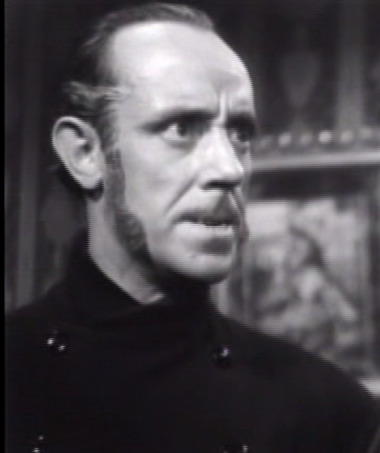
Javert goes to question the jeweller, who has never seen Valjean before.
Valjean and Cosette continue their shopping tour. Cosette scolds Valjean because he spends so much money on her, but hasn’t bought so much as a tie pin for himself. I’m surprised she doesn’t know him better, because as she says this, Valjean stops in front of a store selling used books. He tells her a story about how, a long time ago, he was in Paris after not having seen the sun for years (wink, wink, nudge, nudge) and he went to a park and sat down on a bench. It was dusk, but he was nervous and didn’t have any means to calm down. So he promised himself to one day buy a used book and return to that park and read during dusk and be happy.

Also, why does it have to be a used book?
Inside, two guys are discussing secret stuff. Valjean and Cosette continue discussing happiness and I feel like I missed something, because Cosette is asking him to promise something, but I don’t know what. Valjean pays half a franc and leaves. One of the two guys follows them. His friend, the book shop owner, knows why immediately.
Indeed, the next scene shows us Valjean and Cosette on a bench in a park. A gendarme passes. Valjean’s face gets dark. Foreshadowing… Marius is super-obviously watching them. Cosette asks Valjean about it who is alarmed at first. Then she tells him that she’s seen the guy before, in the book shop. Valjean immediately gets what’s going on and explains to Cosette that young men will be captivated by a girl as beautiful as her and that this one won’t be the last. Cosette doesn’t really understand. She says they shouldn’t do that and she doesn’t like it. Valjean makes her promise that she never talk to anybody he hasn’t introduced to her, which she does without a second thought. But what is that? A coach driver is shouting at his horse. Valjean drops his book and runs over where he wrestles the whip from the man’s hand. The coach driver says that he can do with his horse as he pleases, Valjean asks: “Would you like me to give you a few whip lashes so you learn to be humane?” I am not making this up. Cosette interferes and Valjean says that he has never been able to stand the sound of a whip. Anvils needing to be dropped, anyone?
Cut. Cosette is really happy in their new home. Valjean looks out the window and spots Marius outside. Valjean and Cosette have a little heart to heart in which Valjean calls her his “paradise on Earth, that all men seek and yet few reach.” As attempts to describe Valjean’s feelings for Cosette, this is among the better ones. Valjean looks out the window again, but… this time it’s Javert on the exact spot where Marius stood a minute ago!
Cut. Valjean paying someone for the house. As he leaves, a girl watches him. She then goes up to the agent and asks for “the list”. Apparently, he sells her father a list of clients regularly. An interesting way of getting Thénardier on Valjean’s trail, but somehow I don’t buy it. Éponine pays eight francs for the list – that would be a huge amount of money for the Thénardiers, but to the agent, it’s peanuts. Thénardier sends Éponine to “Fauchelevent” with a letter.
In the office of the Prefect of Police, Javert has just brought in last night’s haul of criminals. The prefect thinks Javert is concentrating on the wrong things as Paris is currently a powder keg swarming with revolutionaries and now he wants the authorization to go look for someone who’s disappeared long ago. Javert insists that this someone is alive and in Paris. The prefect tries to convince him with a newspaper cutting, saying that the man he is looking for drowned after saving the life of an Italian sailor. Javert doesn’t believe it.
Now, as ways of getting in some backstory and building suspense, this isn’t necessarily the worst way of doing it. I don’t know if there’s any point to it, but of course I have no way of knowing how much the original audience (remember, Mexico, 1943) would have been familiar with the novel. If you don’t know what’s going on, this might actually work. But: why did they have to make the scene ridiculous? Because rather than just having this be a “normal” office scene, the prefect is seen doing his morning “toilette”. It looks like he had his butler shave him just before the scene began and now is getting perfumed and bothers a clearly annoyed Javert with the horribly difficult decision of whether to wear silver or onyx cufflinks. Javert protests that he doesn’t know anything about this, but, to please the prefect, he says that the onyx cufflinks are really marvellous. The prefect agrees: “You are right, Javert […]”, which Javert uses as an in to get back on topic: “I am also right about the rest”. He does finally get permission to start searching for “that person”.
Cut. Valjean talking to Éponine at the gate and agrees to come, but he is worried about how they know his name and dwelling. In what is by default the Gorbeau House, Thénardier is making plans. I’m not telling this scene, it is very close to the book and one of the best parts of the entire movie. The chair, the window, the bed, it’s all there. A nice touch is Thénardier practicing his speech to Valjean.
Similarly, most of Valjean’s first time in the Thénardier flat is close to the book (only lacking Cosette), with one big exception: Valjean is much less gullible in this one, he questions Thénardier about how he got his name and address and even tells him that he thought the letter was some kind of scam, but now feels that he was wrong. As in the book, he promises to return with money, but leaves the clothes he brought.
As he leaves, we go back to brick accurate as Thénardier tells his wife where they’ve seen Valjean before. In the meantime, Éponine has gone to talk to Marius. They combine the two meetings into one, not badly. Marius returns the letters Éponine dropped which we never before or after hear about and Éponine doesn’t refuse Marius’ money which he pays her for the info about Valjean (whom he saw go up the stairs). Also, Éponine tries to confess her love to Marius, but he doesn’t get it, not even after Éponine tells him how she’s seen him and his friends and they are all handsome but he’s the most handsome of them all…
Call me petty, but on top of a little slow, this Marius also isn’t all that handsome in my opinion:
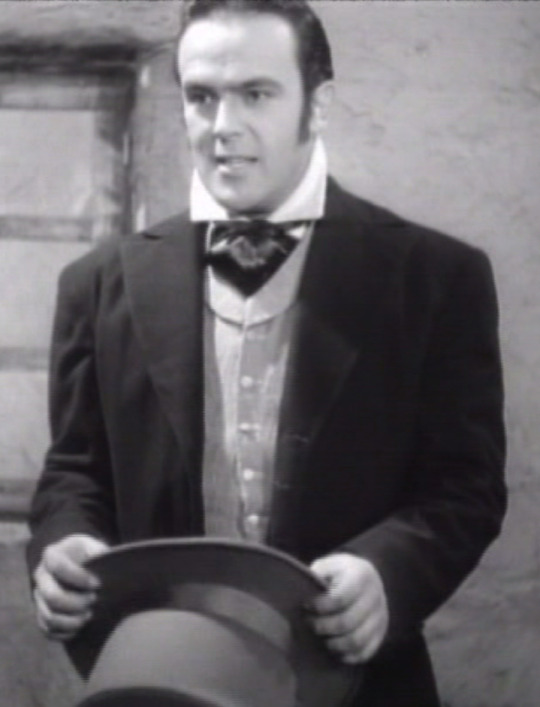
But then, I’ve also seen prettier Cosettes:

Anyway. Marius goes to Rue Plumet immediately and calls out to Cosette through the gate. He asks to speak to her father, but Cosette says that he’s just left. Marius answers the question on whether there’s a message with “Only that his daughter is the most beautiful woman in Paris”. Cosette’s slightly taken aback, but Marius begs her to listen and tells her how his been in love with her ever since he first saw her in the book shop of his friend Joly and how he’s searched her everywh… Wait a second: the book store of his friend Joly???
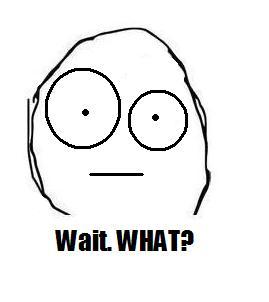
Cosette remembers she’s not supposed to talk to strangers, but Marius points out that this prohibition has already been broken, so they can continue. He promises to pass every day and Cosette skips away happily.
Cut. Javert walks the dark streets. Suddenly he sees something. He stops. He steps into a corner. Valjean is passing with a parcel under his arm. What a coincidence! Javert follows him. Valjean enters number 52. Close, but no cigar.
I have nothing really to say about the entire “guet-apens”. Most lines are taken from the brick, the only departure from the original is the scene’s end. Javert, who’s there by coincidence, intervenes the moment he hears the fight going on. But by the time he’s run up the stairs, Valjean has managed to escape through the window, only noticed by Marius. Oh, and Javert’s only snarky line is (to Thénardier): “It’s been a while that I’ve been curious to know how you employed your precious time.” Meh…
Cut. Cosette in front of her mirror, talking to her doll. She even takes the doll when it’s time to meet Marius. We learn that they’ve been meeting for two months. As Marius walks away, he meets Éponine. She laments that she wouldn’t have given him the address if she had known what he wanted it for. Marius tries to pay her, but this time she refuses.
Cut. Valjean walks through the streets. So does Javert. Valjean arrives at a commotion; a cart has crashed and… wait what?
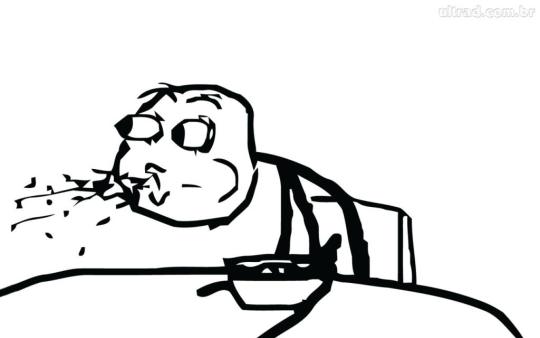
Yes, it’s the Fauchelevent cart incident happening in 1831 and in Paris. It gets solved the way it always does, only with the presence of both Valjean and Javert being even more of a coincidence. And when Valjean crawls out from under the cart, Javert immediately arrests him.
I should add though, that I would call this scene quite well done if it were in the right place. The dialogue between Valjean (already under the cart) and Javert is filmed in such a way that we see the two men from each other’s perspective, looking down on Valjean and up at Javert. I think it works pretty well.
Cut. Valjean is getting interrogated by the prefect of police, who seems to be most interested in Thénardier’s attempted robbery. We also learn that the house is in fact in Gorbeau Street. Ah well, close enough. Javert is silent during all of this but then goes to open the door. We see the shadow of a man with his hands in chains hanging from the ceiling. Javert gives a sign and somebody unseen starts whipping the man. Valjean reacts, but then just crosses his arms behind his back. Javert and the prefect watch him closely. Only the audience gets to see how, behind his back, Valjean digs his fingernails into the back of his hands until the blood flows. The prefect ends the flogging and we learn that they did this little test, because “the real Valjean” turns into “a real savage” when he sees somebody being flogged. This person didn’t so he obviously can’t be Valjean and is free to go.
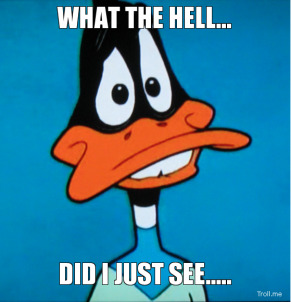
Sigh… I feel like I did when watching the 1978 movie for the first time. All exited when it started in 1796 in Faverolles and the seven children, the ferrage, the cadène… It all looked like I’d get a well-researched, accurate and detailed adaptation, only to then get progressively worse until I could practically hear the movie laughing at me for ever thinking it could be good.
I feel similar now. Okay, it had a few bad moments before, but the beginning seemed good and it only got worse and worse until something as ridiculous as this last scene. On first viewing I actually stopped there and only continued the next day.
Anyway, Javert next goes to the convent and learns that Fauchelevent came to the convent in 1815, 17 years ago (so it’s 1832 now?) but according to Javert, Valjean was still in Toulon 15 years ago. After Javert leaves, a sister informs the Mother Superior that she made a mistake: The Fauchelevent who came to work for them in 1815 was the brother of the one who left a year ago. The Mother Superior says that after so many years, one can make mistakes and closes the ledger.
Cut. Marius and another revolutionary are talking in a pub. Marius is worried because Joly hasn’t shown up yet. He also fears that “they” have left the revolutionaries alone. Okay, they mean the people, right? Wrong, because then the other guy says that they can certainly count on the people to join them. Okay, I’m officially confused. Joly arrives and brings the staggering amount of two pistols, followed by another guy announcing that Lamarque is dead and will be buried at noon tomorrow. They decide to go to the funeral and avenge him. Why?
But first, Marius has to talk to Cosette. Yes, despite Cosette, he still plans to join the uprising and is really happy about it, too. He mentions dying for the cause and how glorious that would be. Of course Cosette wants him to be safe and Marius gets annoyed at her for suggesting that he should “commit such cowardice”. He honestly seems to be completely surprised that she’s unhappy at the announcement that he might die. But then he assures her that he will return for her and Cosette promises to pray for him. They kiss… and who would step into the garden but Valjean. He sends Cosette into the house and then tells Marius that he doesn’t want explanations from him. But still stays to talk, for whatever reasons. Marius still justifies himself: “The appearances may condemn me, but…” Valjean threatens to call the police. To which Marius tells him that he witnessed the Gorbeau incident. He seems to clearly know that he can threaten Valjean with his knowledge, but then ends with “Appearances condemned him, too. But not me.” Valjean doesn’t answer, just unlocks the gate.
Back in the house, Valjean scolds Cosette for her actions. Cosette responds with a long rant that could have been summarised with a simple “I love him”. It contains about as much info…
Cut. The barricade is being build. Unless I’m very much mistaken, they are building it in front of number 52, Gorbeau Street. That guy is still certain that the people will join them.
Cut. Cosette is nervously pacing in the living room. She finally makes up her mind and for the door. Valjean stops her. Cosette declares that she will join Marius and fight or die with him. Valjean talks to her about the danger, but Cosette doesn’t care. Valjean asks if being with Marius is the only thing she wants and when Cosette says yes, he tells her to wait.
Next we see him walking along a street in workman’s clothes. However, Javert is close by, tailing… someone else. Valjean sees Javert’s two acolytes as they arrest some guy we’ve never seen before and knocks both out. He then gets access to the barricade saying that he is looking for Marius de Pontmercy. Hm, did his last name ever get mentioned?
Javert also manages to get in, undisguised and nobody even tries to stop him. He spots Valjean… and tries to arrest him there and then. Really, Javert? You really thought this would work? The outcome is predictable. Valjean claims to not know Javert, but one of the revolutionaries recognises him: A few moments ago, he spoke to “the traitor Combeferre”.
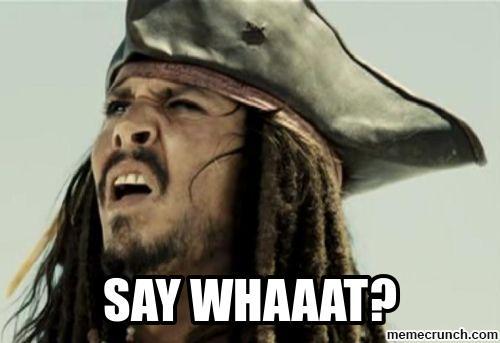
Valjean nevertheless stops them from killing Javert, telling them to tie him up, so that he can “take care of him” later.
The first attack. Even Valjean joins in. Wrong! They fight back the first wave, only one soldier makes it to the barricade. As he sticks his rifle through the barricade, Éponine catches it and directs it into her stomach. Marius then kills the soldier before he and Éponine have a little heart to heart. Éponine finally manages to tell Marius that she loves him in words clear enough for him to understand. She requests her kiss and dies. Marius gives her a quick peck on the front.
Joly wants to kill Javert now, but another guy (I’m just going to call him Enjolras now, because of the unnamed guys he gets the most lines) stops him, because they are not murderers. Valjean steps up and says that he has unfinished business with Javert. Didn’t you claim to not know him less than ten minutes ago? Enjolras has forgotten this and allows Valjean to execute Javert, asking him to make sure that Javert has an easy death. Javert snarks about Valjean and his knife but when Valjean frees him, he leaves without another word.
And this is where I have to stop. If you enjoyed this, return I don’t know when for part 2.
Which can now be found here: http://trompe-la-mort.tumblr.com/post/138905351513/recap-of-los-miserables-part-2
#Les misérables#Los miserables#1943#Los miserables recap#I decided to use memes after having written wait what what felt like a dozen times
20 notes
·
View notes
Text
Le Chemineau, 1905
The first adaptation of Les Misérables, that actually tells a part of the story. To be found on youtube now! Hurray!
https://www.youtube.com/watch?v=rg0smEpO3vE
#Les misérables#Le Chemineau#Adaptations#Albert Capellani#Is that an unhappy ending though#Unexpected findings
1 note
·
View note